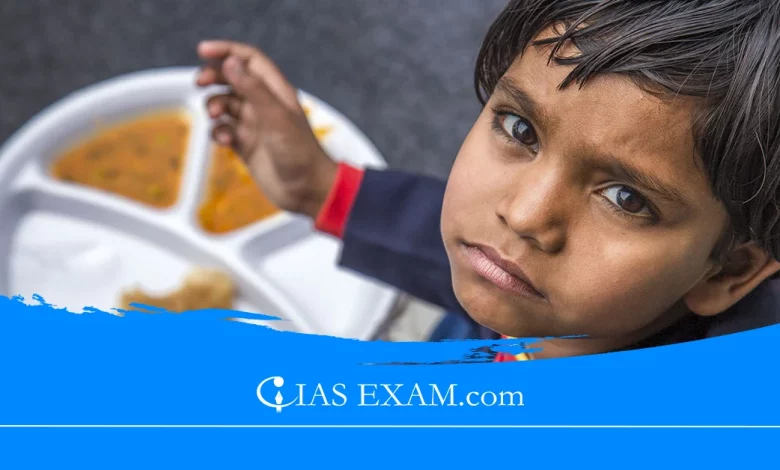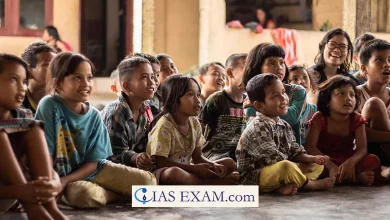India’s ‘Zero-Food Children’: Report Highlights Crisis
Syllabus: Health[GS Paper-2]

Context
A recent study shows that a concerning number of children aged 6-23 months in 92 low- and middle-income countries did not eat any food for a whole day.
Details about the Report
- India’s ‘Zero-Food Children’ refers to a distressing phenomenon where a significant number of children across the country suffer from malnutrition and lack access to adequate nutrition.
- A recent report has shed light on this crisis, highlighting the urgent need for action to address the root causes and mitigate its impact on children’s health and well-being.
- The report reveals alarming statistics regarding the prevalence of malnutrition among children in India.
- Despite various government initiatives and interventions, a significant proportion of children continue to experience food insecurity, leading to stunted growth, underweight, and micronutrient deficiencies.
What is the defination of ‘Zero-food’ Children’?
- Children categorised as ‘zero-food’ did not consume any animal milk, formula, or solid or semisolid food in the past 24 hours.
- This group is particularly important as, around six months of age, relying solely on breastfeeding is not enough to provide all the necessary nutrients for a child.
- It is crucial to introduce solid or semisolid foods in addition to breastfeeding to adequately support the nutritional requirements of early childhood, which is vital for proper growth and development.
Factors Contributing to the Crisis
- Poverty and Inequality: Leading causes of different economic levels and poverty avail food insecure children. Households that are caught on the thread line of poverty are usually unable to feed on food of quality, and in the end they become malnourished.
- Lack of Access to Healthcare: For many disadvantaged communities especially in the rural areas the poor access to healthcare services, only serve to exacerbate the current challenge of malnutrition. The kids belonging to such low-income families often cannot reach essential healthcare services which include preventative care, nutritional aid and remedial measures for the diseases caused by undernutrition.
- Poor Dietary Practices: Insufficient knowledge about diet and the exercising unhealthy food habits are the significant reasons behind the malnutrition of children. Like, you are likely to use food that is cheap and energy dense, lack dietary diversity, or cultural belief surrounding food, that might lead to the malnutrition of your child.
Impact on Children’s Health and Development
- Malnutrition, which has grave effects on children’s health, progress, and the whole well-being, is related to their physical growth, brain development, and general life.
- Children suffering from malnutrition, are likely to be more susceptible to infections and chronic diseases, and may develop some congenital defects that linger till later. This may lead to them performing poorly in school and even to a dismal future.
Addressing the Crisis
- Strengthening Social Safety Nets: Society must be designed with inclusive social security and assistance programs that give equal opportunities for families with no income and provide the relevant food and health care facilities. The government welfare programs, including intervention programs that lower food prices, fortnightly cash or food packages, nutrition supplements, and school feeding schemes, are an important element in eliminating food shortage of children.
- Improving Healthcare Infrastructure: Supporting the healthcare infrastructure development, especially in the context of Backward or unserved areas, represents the foundation for combating malnutrition by improving healthcare services accessibility. Here we talk about building infrastructures that cover the holes of the primary healthcare centres, generating maternal and child health services, and implementing nutrition specific measures.
- Promoting Nutrition Education: The promotion of nutrition education and awareness programs is paramount in attaining a state where the community members will be equipped with not only knowledge, but also the skills required to make informed choices about nutrition and diet. These programs should be parent- and caregiver- to-direct such training to educate the parents and other caregivers on the optimal infant and young child feeding practices and dietary diversity among others.
Conclusion
The report on India’s ‘Zero-Food Children’ underscores the urgent need for concerted efforts to address the root causes of malnutrition and food insecurity among children. By prioritising investments in social welfare, healthcare infrastructure, and nutrition education, India can mitigate the impact of malnutrition and ensure a healthier future for its children.
Source: The Hindu
UPSC Prelims Practice Question
Q.Critically analyse the implications of the recent report on ‘Zero-Food Children’ in India, highlighting the challenges and potential solutions to address the crisis.





.png)



